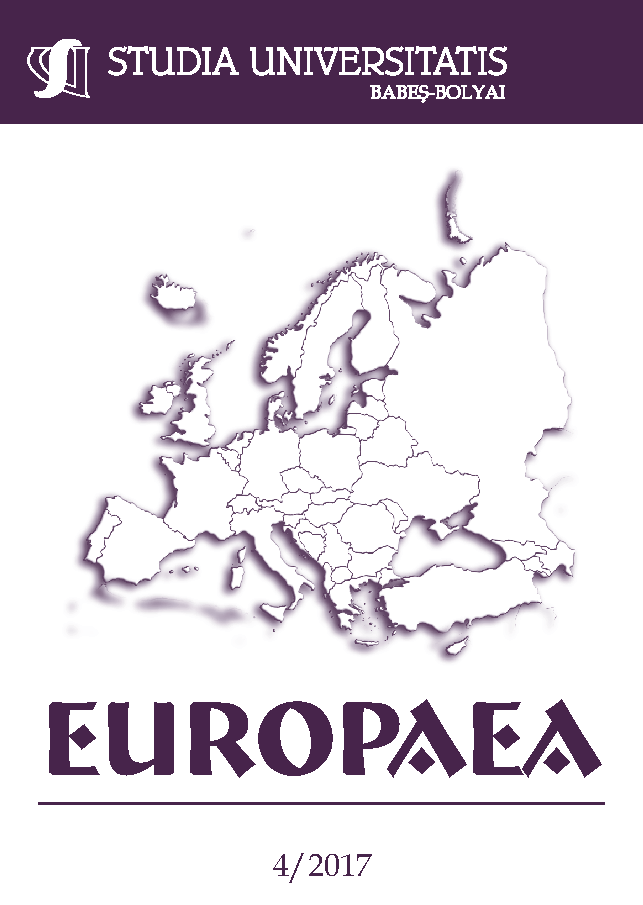LA CONSTRUCTION DE L’ÉTAT AU KOSOVO
DOI:
https://doi.org/10.24193/subbeuropaea.2017.4.13Keywords:
Kosovo, Quasi- État, crise, Relations internationalesAbstract
This article analyzes the difficult process of State-building in Kosovo. It shows that the increasing number of International actors produces a parallel bureaucracy over Kosovo’s administration. The parallel bureaucracy leads to overlaps and inconsistencies during the crisis management. At the same time, Kosovo’s international situation of Quasi-State leads to quasi legitimacy which has a major impact over the actions of International actors as the European Union. As an International phenomenon, the Quasi-State concept only makes sense if related to the historical and social framework in which it emerged and thrived. In order to analyze the difficult establishment of the rule of law in Kosovo, we will analyze the genesis of the phenomenon in its historical context and national specificities; secondly, we will discuss the interactions between such International actors and the administration of Kosovo on the one hand, and mafia sovereignty claims, on the other. Kosovo's sovereignty is divided between ethnic communities, International actors and Mafia.
References
Agamben, Giorgio (2005), State of Exception, 1ère éd., University of Chicago Press, Chicago.
Allison, Graham, Zelikow, Philip (1999.), Essence of Decision: Explaining the Cuban Missile Crisis, 2ème edition, Longman, New York.
Badie, Bertrand (1992), L’État importé. L’occidentalisation de l’ordre politique, Fayard, Paris.
Badie, Bertrand (1999), Un monde sans souveraineté. Les États entre ruse et responsabilité, Fayard, Paris.
Fabry, Mikulas (2008), « Secession and State Recognition in International Relations and Law », in : Pavlovic, A. et Radan, Peter (éd.) On the way to Statehood : Secession and Globalisation, Asghate, Asghate Publishing Limited, pp.51-66.
Jackson, Robert (1990), Quasi-States : Sovereignty, International Relations and Third World, Cambridge University Press, Cambridge.
Keohane, Robert, Nye, Joseph (1971), Transnational Relations and World Politics, Cambridge University Press, Cambridge.
Landry, Tristan (1999), La Bosnie hier, le Kosovo aujourd’hui…et demain?, Les Presses de l’Université Laval.
Laroche, Josepha (2012), La Brutalisation du monde. Du retrait des États à la décivilisation, Liber, Montréal.
Laroche, Josepha (éd.) (2003), Mondialisation et gouvernance mondiale, PUF, Paris.
Roux, Michel (1999), Le Kosovo, Éditions La Découverte, Paris.
Strange, Susan (1996), The Retreat of the State. The diffusion of Power in World Economy, Cambridge University Press, Cambridge.
Schmitt, Carl (2005), Political Theology, 2ème éd., University of Chicago Press, Chicago.
Weber, Max (2002), Le savant et le politique, Essai (Poche), Paris.
Articles
Chassagne, Philippe, Trafic de drogue dans les Balkans, Confluences Méditerranée, Revue trimestrielle N° 30, 1999., pp. 38-56.
Chassagne, Philippe, GJELOSHAJ, Kole, L’émergence de la criminalité organisée albanophone, Cahiers d’Études sur la Méditerranée Orientale et le monde Turco-Iranien, N° 32, 2001, pp. 1-20.
Durand, Marie-Françoise, De Vasconcelos, Alvaro, La PESC, Ouvrir l’Europe au monde, Presses de Sciences Po, Paris, 1998.
Dursun-Ozkanca, Oya, Crossley-Frolick, Katy, Security sector reform in Kosovo: the complex division of labor between the EU and other multilateral institutions in building Kosovo’s police force, European Security, Vol. 21, n°2, 2012, pp. 236-256.
Ghebali Hebali, Victor-Yves, Totem et tabou dans le conflit du Kosovo. Remarques sur les limites naturelles d’une médiation internationale, Rationalité et Relations Internationales, vol. II, n° 37, 2000, pp. 2-12.
Economides, Spyros, Kosovo, Self-Determination and the International World Order, Europe-Asia studies, Vol. 65, n°5, pp. 823-836.
Huzinger, Laurence, Les routes de la contrebande en Europe du Sud-Est et les nouveaux esclavagistes, lettre de Belgrade, Hérodote, Vol.12, n°1, 2004, pp. 178-182.
Ker-Lindsay, James, Economides, Spyros, Standards before Status before Accession : Kosovo’s EU Perspective, Journal of Balkan and Near Eastern Studies, Vol. 14, n°1, 2012, pp. 77-92.
Lemay-Hérbert, Nicolas, Everyday Legitimiacy and International Administration : Global Governance and Local Legitimacy in Kosovo, Journal of Intervention and Statebuilding, Vol. 7, n°1, 2013, pp. 87-104.
Petithomme, Mathieu, L’État de facto du Kosovo sous tension : vers la persistance d’une souveraineté imparfaite ? Balkanologie, Vol. 12, n° 1, 2010.
Sahin, Selver B., How Exception Became the Norm : Normalizing Intervention as an Exercice in Risk Management in Kosovo, Journal of Balkan and Near Eastern Studies, Vol. 15, n°1, 2013, pp. 17-36.
Shepherd, Alistair J. K., A Milestone in the history of the EU : Kosovo and the EU’s international role, International Affairs, Vol. 85, n°3, 2009, pp. 513–530.
Visoka, Gezim, The ‘Kafkaesque Accountability of International Governance in Kosovo, Journal of Intervention and Statebuilding, Vol. 6, n°2, 2012, pp. 189-212.
Vrbetic, Marta, Afraid of a ‘Kosovo Scenario’ : A Disquieting Precedent for International Conflict Management, Journal of Intervention and Statebuilding, Vol. 7, n°3, 2013, pp. 308-334.
Rapports
C.I.J., Conformité au droit international de la déclaration unilatérale d’indépendance relative au Kosovo, avis consultatif, C.I.J. Recueil 2010.
Commission européenne, Key Findings of the Progress Report on Kosovo, 2013, mis en ligne le 16 octobre 2013. http://europa.eu/rapid/press-release_MEMO-13-892_en.htm
EULEX Kosovo, Technical arrangement between KCHA and EULEX, mis en ligne le 06 décembre 2009. http://www.eulex-kosovo.eu/en/justice/
European Court of Auditors, European Union assistance to Kosovo related to the rule of law, Special Report No 18/2012. http://eur-lex.europa.eu/LexUriServ/LexUriServ.do?uri=CELEX:52012SA0018:EN:HTML
Friedrich-Ebert-Stiftung, NATO presence in Kosovo. Implications of KFOR troop reduction and essential political processes, Friedrich-Ebert-Stiftung Kosovo, mis en ligne en 2011. http://www.fesprishtina.org/wb/media/Publications/2011/Nato%20Presence%20in%20Kosovo%20%28English%29.pdf
Hoogenboom, Jitske, The EU as a Peacebuilder in Kosovo, Pax Christi, European Peacebuilding Liaison Office, publié le 28 juin 2011. http://www.eplo.org/assets/files/2.%20Activities/Civil%20Society%20Dialogue%20Network/Member%20State%20Meetings/Romania/EPLO_Policy_Analysis_EU_as_a_Peacebuilder_in_Kosovo_CSDN_Meeting_Romania.pdf.
Marty, Dick, Traitement inhumain de personnes et trafic illicite d’organes humain ay Kosovo, Assemblée Parlementaire de l’Union Européenne, AS/Jur (2010 46, mis en ligne le 12 décembre 2010. http://www.assembly.coe.int/CommitteeDocs/2010/ajdoc462010prov.pdf
Roudy, Yvette, Andre, René, Mangin, René, Députés, Rapport d’information déposé en application de l’article 145 du Règlement par la Commission des Affaires Etrangères sur la mission effectuée par une délégation de la Commission au Kosovo, enregistré à la Présidence de l’Assemblée nationale le 31 mai 2000.
United Nations Departement of State, 2013 Trafficking in Persons Report – Kosovo, mis en ligne le 19 juin 2013. http://www.refworld.org/docid/51c2f3af4d.htm
Downloads
Published
How to Cite
Issue
Section
License
Copyright (c) 2017 Studia Universitatis Babeș-Bolyai Europaea

This work is licensed under a Creative Commons Attribution-NonCommercial-NoDerivatives 4.0 International License.



